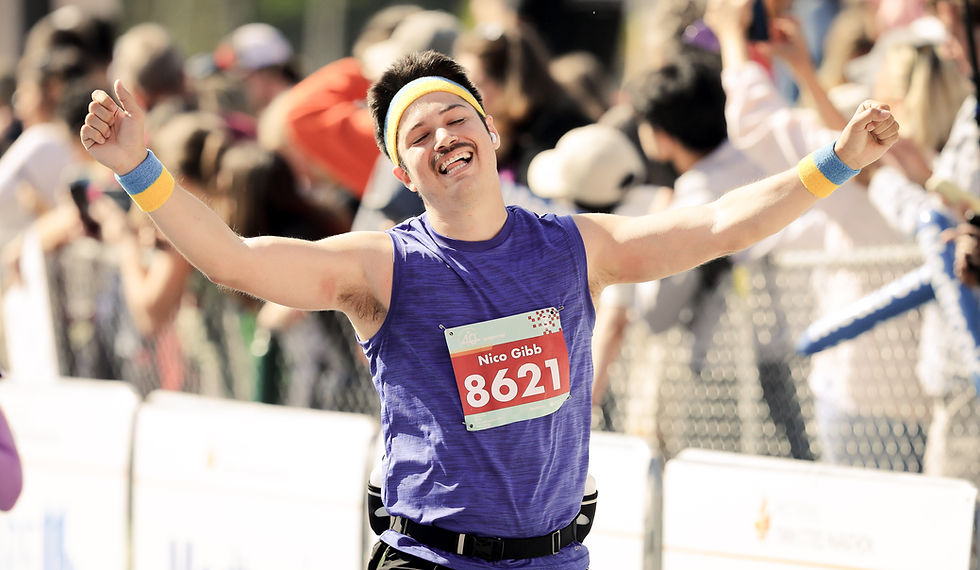5 Tips for Your Final Weeks of Training
- charlie4243
- Aug 19, 2025
- 4 min read

My first marathon was a disaster, but yours doesn’t have to be! I ran my first marathon back in 1991 and it did not go well. (You can read the whole story here.)
The training advice available to novice marathoners in the pre-internet age was quite limited, but you may be feeling the opposite problem now—information overload! So, let’s distill things down. Since that disastrous TCM 34 years ago, I have run 50 additional marathons.
Here are my top 5 tips for marathon (or 10 mile) success:
It’s OK to Modify Your Training Plan BUT Follow the Taper
You likely chose your training plan months ago, but what if you are having trouble keeping up with the recommended mileage in your plan? Some “beginner” plans are anything but, with runs 6 days/ week, speed workouts and a peak weekly total of 50 miles.
Keep in mind that you do NOT need to run this much to have a successful marathon.
Running more days per week means less days for recovery. Speed workouts increase risk of injury. How do you know if your training plan has you doing too much? Watch for signs of overtraining like poor sleep, persistent fatigue and muscle soreness, frequent injury or illness, and decreased performance.
If you are experiencing any of the above, consider bumping the training load down, either by decreasing the length of each run or by taking an extra day (or two) off per week. The one constant in a marathon plan is a progressively increasing long run every 1-2 weeks. Everything else, including speed workouts and weekly mileage, is negotiable. A few tweaks to customize your plan often make a huge difference between arriving at the starting line prepared and ready to run vs overtrained and injured. (Need help customizing a plan? Click here)
Finally, make sure your plan includes a taper. The taper is a period of 2-3 weeks at the end of training where you intentionally cut back your running mileage. Resist the urge to run too much during your taper just because your legs feel fresh again. Save it for race day!
Run a Tune Up Race
When I entered the starting corral at the 1991 TCM it was my very first road race. I was filled with race day anxiety because I had no idea what to expect. To avoid this, consider running a shorter tune up race. Even a 5K or 10K can give you practice lining up and sharing the road with big groups of runners as both the TC 10 mile and marathon can be crowded in the early miles. Having a chance to fine tune your pre-race breakfast and bathroom breaks can also be helpful. Longer races can even serve as supported training runs, giving you a chance to test your race day fueling, running outfit and shoes.
Don’t Ignore Early Signs of Injury
This was my biggest downfall. My knee started hurting a couple of weeks before my marathon and instead of seeking out a doctor or physical therapist, I asked my friend for advice. If you have a body part that consistently hurts for more than a few days and is not improving, see a healthcare professional that works with runners. Injuries are easier to treat when caught early and that results in fewer missed training runs. When in doubt, get it checked out!
Telling the difference between normal training soreness and impending injury can be tricky. This was covered in previous blog posts:
Check the Mileage on your Shoes & Consider Rotating your Trainers
You have already been training for weeks and the mileage on your shoes may be starting to add up. 300 miles is a rough estimate of when running shoes start to lose their support, but that number varies widely among runners and shoes. Investing in a new pair may be beneficial for a couple of reasons: if the new pair feels vastly more supportive it’s a good hint that it’s time to retire the older pair. And having a second pair may protect you from injury. Different shoes apply different stresses to your body and one study even found that runners who rotated shoes were 39% less likely to sustain injury. (Read that study here.)
Have a Race Day Fueling Plan & Practice it in Advance
This was talked about in last week’s Connection, but it bears repeating because it is so important! Endurance nutrition is light years ahead of the advice I was given back in 1991. We now know the importance of adequate carbohydrate intake in the days leading up to and during the race for all levels of runners. Marathoners should increase their carbohydrate intake for 2-3 days before the race. Race day fueling should include a carbohydrate-rich breakfast and a minimum intake during the race of 30-60 g/hour. This is a lot of carbohydrates and you will want to practice in advance! For instructions and advice on how to fuel see these previous blog posts on nutrition:
Even with perfect preparation, the marathon may not go exactly as you planned and that’s ok. If you arrive at the starting line well-trained, well-rested and well-fueled, you will be prepared to handle that adversity and finish strong. Good luck!
The information provided in this article and linked videos is intended for general education and demonstration purposes only. It does not substitute for professional medical advice. Consult a medical professional or healthcare provider if you seek medical advice, diagnosis, or treatment specific to your individual situation.

Kristen Gerlach, PT, PhD, is a physical therapist who specializes in working with runners. She is one of the team of Motion Experts TCM has gathered to help its subscribers and participants get the most out of their running. Have a question for Kristen: [email protected] or website: instridemnpt.com.


